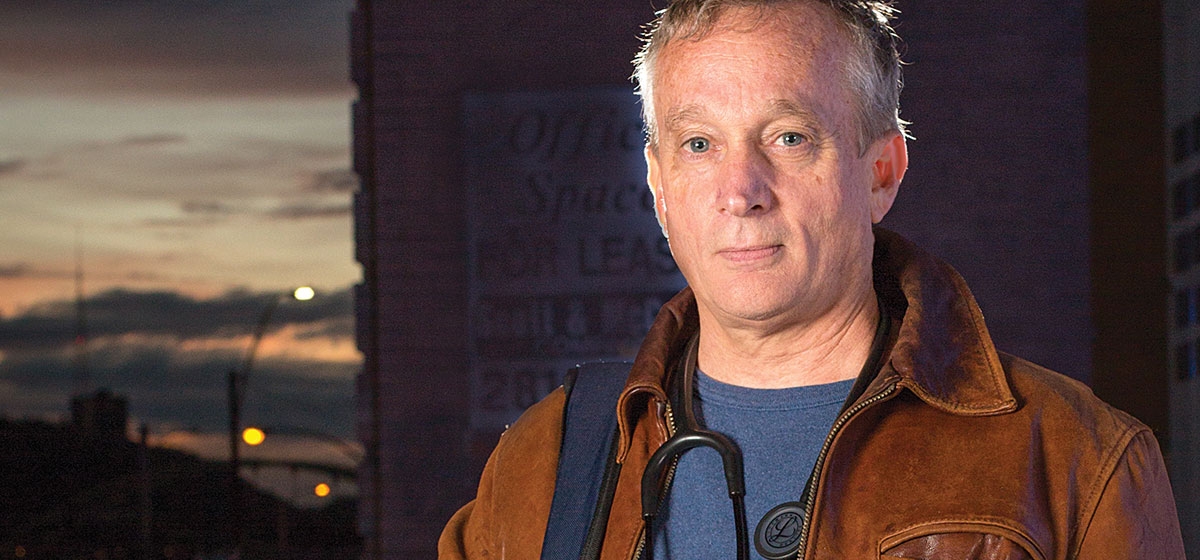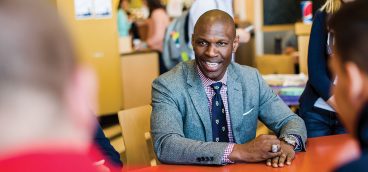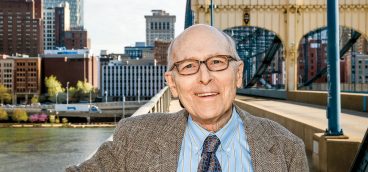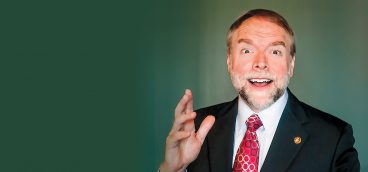Jim Withers, M.D., Street Doctor

My father was a country doctor; my mom, a nurse. Their relationship was grounded in the values of service and compassion, and they included their children—me, for sure—in that vision. So I made house calls with my dad and, among other things, got to practice parallel parking while delivering Meals on Wheels with my mother, just to make sure that, while I was learning to drive, I was also learning about life. I remember seeing some pretty bleak situations: people who were old and lonely, or ill but, nonetheless, grateful to have the food we brought.
Growing up, we lived in Hanover, Pennsylvania; first in town and then in the country. It wasn’t quite Mayberry, but it was classically idyllic, small-town America. There, my dad was a prominent physician, partly because there weren’t too many in the area. He was the pediatrician, the obstetrician, the cardiologist, etc., all in one. As a family, we also made medical trips to Central America, working in Nicaragua (before the revolution) and then, later, in Guatemala. Coming back, I remember talking about how most of the health issues faced by the people in those two countries were tied largely to political turmoil—and poverty. And while we didn’t feel that we helped them all that much, we received a great deal from the people there. It was normal in my family to care. And my parents didn’t just talk about it; they put caring into action. Seeing that gave me a sense of purpose, and it was during those years that I decided to become a doctor.
If your goal is to become a doctor, you start thinking about getting into a good university and keeping your grades up, which was never a problem for me. When the time came, I chose Haverford College, in Philadelphia. Looking back, it made perfect sense. Haverford was a fine school, in the top five of the small liberal arts colleges in America at the time. But what I really liked about it was its value system. The college was of Quaker origin: very progressive and activist. Haverford’s president used to take time off periodically to work as a garbage collector. And the professors all lived on campus, so you could drop by their homes to discuss things. It was a place of true idealism, and that helped to reinforce the values that I brought from home.
At Haverford, however, I realized that I was not likely going to be tops in my class anymore. I worked hard, but the students there were off-the-scale gifted, with perfect SAT scores and a strong competitive spirit. In my junior year, I decided to take a break and went to Wales, where I focused mostly on rock and mountain climbing. All my buddies said, “If you do this, Jim, you’ll never get into med school.” But when I returned as a senior, they all said, “Boy, I wish I had done that.” It was difficult, but I managed to be accepted at a number of good medical schools, and I chose the University of Pittsburgh because it was still within range of my parents. I liked the city’s down-to-earth, blue-collar reputation, and the fact that Pittsburgh is really a big, small town, as they say. So I moved here, and fell in love with the people. I love their history and resiliency. I also love their diversity. Pittsburgh is one of the finest “melting pots” in the world.
For me, medical school was a challenge. I found the culture of medical education more than off-putting. Its value system was a far cry from the one that my parents (and Haverford) instilled in me. Early on, I had some wonderful mentors, but there were also a lot of cynical people to whom I couldn’t relate. They were pursuing things that, to me, were not of a higher order—namely, reputation—and money. To me, health care is and always has been a sacred trust, a profound part of human society, going back to the earliest of times. Sadly, the sacredness of the medical profession, I believe, has been tarnished. The very structure of the health-care system dehumanizes the people we have pledged to serve. It has put distance between the practitioner and the patient. People are processed through a complex mechanism and, as a result, care-givers often lose sight of the fact that we are there for the people, not the other way around. The structure itself has become central. Size is part of the problem, too. With size has come indifference. Over time, we have turned delivering health care from a traditional calling into a forprofit enterprise, and are no longer “doing unto others as we would have them do unto us.”
During medical school and all through my subsequent training, I often felt like giving up, having witnessed an alarming number of spiritually jaundiced people pouring out their frustrations onto not only medical students, but patients as well. Looking down the road, I wasn’t sure where to go in medicine, if anywhere. I wanted to keep my options open, so I chose to practice general medicine, and selected a residency program at Mercy Hospital in Pittsburgh, which I believed maintained the kind of fertile soil in which my values would be honored and, perhaps, even grow. My decision to join Mercy turned out to be a good one. I no longer had to fight the battle of medical ethics. I could focus on learning medicine and delivering care. After all, I didn’t want to be just a well-paid part of the problem; I wanted to be a compassionate part of the solution. When my residency concluded, I became a chief resident, which meant yet another year of training for those of us who were interested in teaching. Coincidentally, Mercy Hospital started its teaching faculty program the year I graduated, and I happily became a part of that.
“I didn’t want to be just a well-paid part of the problem; I wanted to be a compassionate part of the solution.”
—Jim Withers
As a new teacher, I felt called to find a way to nurture those medical students who were genuinely caring and compassionate in hope that these values would spread to others. I was able to teach clinically rather than in a classroom, and got to work alongside young people who were learning, and I liked that environment. I was able to make house calls to some of my patients. I treated people with drug addictions and alcoholism, and remember slipping a couple of bucks to some of those who were so poor that they couldn’t pay for their medicines. I felt like, at least, I wasn’t running away from my fellow human beings; I wasn’t abandoning my brothers and sisters. While a part of me wanted to be a country doctor like my dad—and I’m sure I would have been good at it—I fell in love with the city and became interested in urban poverty, particularly in Pittsburgh’s Hill District—which comprises Mercy Hospital’s main patient base. For a time, I worked there in the clinic at Hill House, where grandmothers, mostly African-American, would come and tell me their personal stories. Soon, I realized that the women I was treating, for hypertension or diabetes, were holding together maybe a couple dozen other people each, because of their strength. “If I make them well, I will be benefitting a lot people,” I thought, and I was proud of that work. It wasn’t a path to the highest financial reward, but it was very fulfilling in a way that my parents and my college professors would have understood.
We’ve all been to doctors who simply report to us the results of whatever medical tests we’ve taken, and then pronouce us either healthy or not. Seldom do they ask us questions about the full spectrum of our lives so as to learn more about who we are, how we live and how we cope with our cirumstances—the reality of our existence. This style of doctoring just didn’t work for me, so I knew that I had to find a way to move beyond the traditional medical system to begin again and reconnect with the concept of actually treating human beings, in all of their complexity. But how? That’s when I decided to undertake the greatest challenge of all: working with the most excluded people possible. Ideally, I wanted my patients to be wary and uncooperative so as to test me as a doctor, and as a human being. To succeed, I would have to make medical treatment work for these people on their terms, as opposed to insisting that they come to me on mine. One winter day, I encountered a homeless man and tried to convince him to remain in the hospital because he was very ill, but I was unsuccessful. Soon thereafter, he headed out into a snowstorm and froze to death. The sadness of this got me thinking about all of those people out there, and that’s when I discovered my true calling: reaching out and providing health care services for even the most intractably homeless people in our community.
My first thought was that the outreach work I had in mind was so outside-the-box that I best not tell anyone. My colleagues would think I was crazy. Moreover, maybe my malpractice insurance wouldn’t cover it. And then there was this: I was a full-time employee of a hospital, and the time I would have to devote to make this outreach effort successful—while I would not charge for it and would conduct it during my off-hours—surely would require institutional approval of some kind. But I didn’t want to go through any administrative rigamarole because I was so passionate about getting on with it. Long story short, I met a man, formerly homeless, who, for six years, had been venturing out to help homeless people on the streets of Pittsburgh. His name was Mike Sallows, and he was not a doctor, but maybe we could work together, I thought. After all, Mike knew the streets far better than I, having lived out there once himself.
At first, he was skeptical about bringing a doctor along with him, but was also keenly aware of the medical problems that existed among the local homeless population. Finally, he told me that he’d take me out with him on two conditions: (1) that I didn’t dress like a doctor; and (2) that I didn’t act like a jerk. So I dressed like a homeless person, and Mike and I began making our rounds at night: “House calls for the homeless,” I thought. But I must tell you that I didn’t get into this work simply to improve the lives of homeless people. Hopefully, that would happen. What I was really interested in was changing how medicine is practiced. I wanted to change how doctors approached their work and their patients. But from where do you start? From within your comfort zone, your own “reality?” Or do you start from someone else’s? To me, that’s the whole deal, right there. Anyone can do things on their own terms. But the deep end of the pool is “reality”—and reality is not for beginners. It’s important to remember that every person has their own unique story, and that the best teachers in the history of medicine have always emphasized that the person and their story hold the keys to diagnosis and healing.
My journey has been a classic adventure story. It’s Joseph Campbell’s “Hero’s Quest,” where one leaves the village and, in his travels, encounters all types of strange lands and strange people, and his experiences with these lead to his growth as a person. He realizes that the world is bigger than his original perspective, and that what was said back in the village, from time immemorial, wasn’t always true. In fact, the people who are the most feared and mistrusted often turned out to be amazing. I was experiencing this, and it was intoxicating. But there came a point at which I had to let Mercy Hospital in on my secret. As time wore on, my outreach work was really cutting into my rest time between shifts and, to be honest, got a bit out of control. I was out until the wee hours, two and sometimes three nights a week. I went through a rather obsessive period, I guess, driven by my fascination and compassion after getting to know some people on the streets who were literally dying: some in their 70s and 80s, runaway kids, people with frostbite or wounds that hadn’t been treated. I thought that I knew the local cityscape, and yet there was a whole invisible world carrying on in between the buildings. Behold, “reality.”
By the end of 1992, three or four nurses were venturing out at night with their own formerly homeless partners in a coordinated strategy. Homeless people were visiting Mercy’s clinic and asking for follow-up care. A secretary in the hospital’s department of medicine was getting calls from homeless people and was beginning to triage them. With help from a friend, we devised an electronic medical record system for our patients. I even began to write a position paper about the program, outlining the potential medical, educational and even economic benefits of this kind of outreach. It made so much sense to be out there, getting to know the people, and helping to connect the dots for them. So I called my malpractice insurance carrier and they were fine with this. Then I went to the CEO of the hospital, a nun from the order of the Sisters of Mercy, naturally. She listened patiently to my story, then told me the history of the hospital.
As the story goes, seven nuns came to America from Ireland in 1843 and walked the streets of Pittsburgh, taking care of the poor and downtrodden. Six of them died doing this during an epidemic. Anyway, those nuns founded the first Mercy Hospital, in Pittsburgh, which led to the establishment of many other Mercy hospitals around the world. I didn’t know any of this! Then our sister CEO said, “What you’re doing, Dr. Withers, is totally in keeping with our mission as an institution. If anyone here gives you trouble, just have them speak with me.” Soon thereafter, by way of a “care for the poor” grant, the hospital helped me to get this outreach program really moving. Operation Safety Net, as we called it, became official in January 1993.
I suppose that, given the values that were inculcated in me by my parents, and nurtured by my professors at Haverford College, I could have become a missionary— an Albert Schweitzer, if you will. Sure, it would be great to work outside the box and do great things. But I realized that it was more important for me to work inside the system. It wouldn’t be easy, but it was a big part of my mission: to remain on the inside and fight for accountability and compassionate medical care. My work is really my life. It’s what I’ve chosen. It’s what my heart and mind both drew me toward. I’ve traded the big paycheck and promotions for more meaning in my work.





